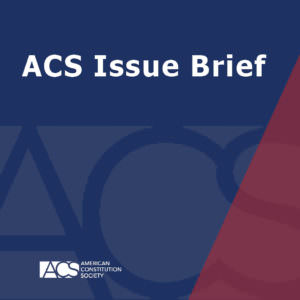Scapegoating Social Security Disability Claimants (and the Judges Who Evaluate Them)

ACS is pleased to release “Scapegoating Social Security Disability Claimants (and the Judges Who Evaluate Them),” an Issue Brief by Jon C. Dubin, Professor of Law, Alfred C. Clapp Public Service Scholar and Associate Dean for Clinical Education, The State University of New Jersey, Rutgers School of Law-Newark; and Robert E. Rains, Professor of Law, Director of Disability Law Clinic, The Pennsylvania State University, Dickinson School of Law. In this Issue Brief, the authors confront mischaracterizations of the process for reviewing social security disability benefits, misleading reports of “renegade” Administrative Law Judges (ALJs), and weak claims about the unconstitutionality of the system.
Responding to a recent attack by Richard Pierce in a Cato Institute publication that called for abolishing ALJ hearings for disability benefit applicants, Dubin and Rains write:
"The population of claimants with disabilities or various claimant subpopulations (and the ALJs who judge them) should neither be discriminated against nor scapegoated in the search for remedies to improve the Social Security Disability adjudication system and in the laudable and necessary process of achieving comprehensive Social Security reform. As the working population ages and the eligibility age for full Social Security retirement benefits gradually rises to 67 (and perhaps beyond), it is simply inevitable that we will see a higher percentage of persons validly receiving disability benefits. It would be a breach of the social contract to deny them those benefits through a procedural dodge — particularly one so ill-suited to addressing the perceived problems. As Vice President Hubert Humphrey once said, “[t]he moral test of government is how that government treats those who are in the dawn of life, the children; those who are in the twilight of life, the elderly; those who are in the shadows of life; the sick, the needy and the handicapped."
Dubin and Rains highlight the crucial role that face-to-face hearings with new “highly developed medical evidence” play in fairly assessing applicants’ claims, and lament the “feeding frenzy in conservative media” over the report of a single Administrative Law Judge who awarded benefits in 99 percent of the cases before him and was later suspended.
“Because neither the Pierce proposal’s media-anecdote-driven factual assumptions nor core legal suppositions about the identified problem are well-founded and because the proposed solutions are both misguided and unsound, this initiative, and other similar initiatives, should be non-starters,” Dubin and Rains write.
Read the full Issue Brief here: Scapegoating Social Security Disability Claimants (and the Judges Who Evaluate Them)
